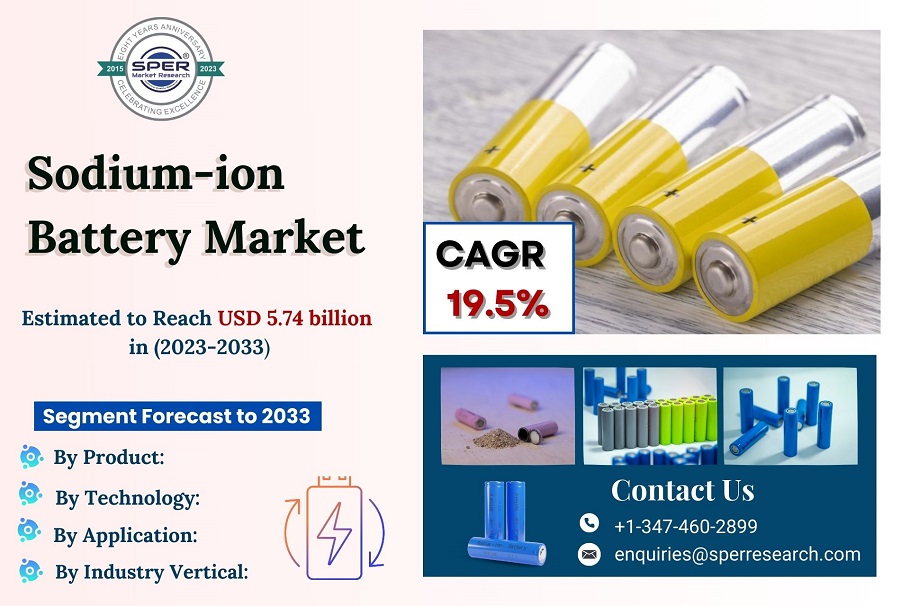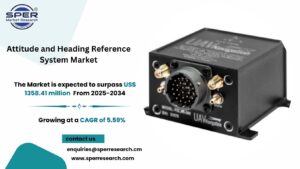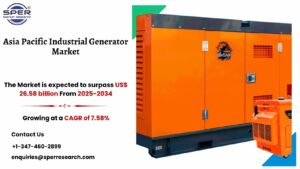Sodium-ion Battery Market Growth 2023, Share, Upcoming Trends, Key Manufacturers, Opportunities and Future Strategies Till 2033: SPER Market Research

As the main charge carriers, sodium ions (Na+) are used in sodium-ion batteries, a type of rechargeable energy storage technology. The wealth of sodium resources and possible financial advantages make it a viable substitute for lithium-ion batteries. An electric current is produced in a sodium-ion battery during discharge when sodium ions travel through an electrolyte from the cathode to the anode. This procedure is turned around when charging. A fascinating possibility for a range of applications, including electric vehicles and renewable energy storage, is the technology’s scalability and compatibility with the current battery production infrastructure.
According to SPER market research, ‘Sodium-ion Battery Market Size- By Product, By Technology, By Application, By Industry Vertical- Regional Outlook, Competitive Strategies and Segment Forecast to 2033’ state that the Sodium-ion Battery Market is predicted to reach USD 5.74 billion by 2033 with a CAGR of 19.5%.
The global demand for sodium-ion batteries has surged, primarily propelled by the electrical and electronic sectors. Manufacturers can transition to sodium battery cells with ease since they can use the same equipment as for lithium-ion components. These batteries rely on abundant sodium metal, ensuring their long-term sustainability. However, their relative novelty in the commercial market and limitations in active use and an underdeveloped supply chain have curbed their growth. The main driver for the sodium-ion battery market is the increasing demand for electric vehicles, fueled by the need to cut carbon emissions and promote renewable energy sources due to climate change concerns. This sustainability focus is expected to drive greater adoption of sodium-ion batteries, which are known for their potential to offer larger capacities than conventional lithium-ion cells while being more eco-friendly.
Request For Free Sample Report @ https://www.sperresearch.com/report-store/sodium-ion-battery-market.aspx?sample=1
On the other hand, energy density becomes a crucial factor to take into account when making decisions when battery capacity is constrained but required energy output is increased. Sodium-ion batteries give off less energy density as compared to lithium-ion batteries. Most likely, this will have an effect on the sodium-ion battery business. Considering sodium-ion technology is still in its research and development stage. Very likely, this challenge will be solved shortly. An industrial supply chain that is robust is necessary to support the active utilisation of sodium-ion batteries, which constrains the market’s growth. Compared to lithium metal, sodium metal is heavier. This limits how much sodium battery is used in electric vehicles. These issues are limiting the sodium-ion battery business.
Impact of COVID-19 on Global Sodium-ion Battery Market
Furthermore, because of remote work, the COVID-19 epidemic increased demand for stationary energy storage devices, especially UPS systems. But the building of solar and wind power plants was hampered by the closure of industrial facilities around the world, which lessened the demand for sodium-ion battery-based storage. Demand for renewable energy surged as demand for fossil fuels fell, highlighting the need for high-capacity energy storage devices to maximise renewable energy sources. The market for energy storage will benefit from this change, especially in renewable energy facilities.
Sodium-ion Battery Market Key Players:
Geographically, the sodium-ion battery market in Europe has been dominant. Germany, Italy, and the UK are also leading in solar and wind energy usage. Europe’s stringent environmental regulations, rapid development, and advancements in cost-effectiveness and versatility have prompted manufacturers to expand production. The region also anticipates strong growth in the electric vehicle sector due to increasing demand, driving sodium-ion battery market growth in Europe. Additionally, some of the market key players are Blackstone Technology GmbH, BLUETTI Power Inc., Indigenous Energy Storage Technologies Pvt. Ltd. (Indi Energy), Natron Energy, Inc., NEI Corporation, Tiamat Energy, Others.
Sodium-ion Battery Market Segmentation:
The SPER Market Research report seeks to give market dynamics, demand, and supply forecasts for the years up to 2033. This report contains statistics on product type segment growth estimates and forecast.
By Product: Based on the Product, Global Sodium-ion Battery Market is segmented as; Sodium-Oxygen (Sodium Air) Batteries, Sodium-Salt Batteries (Zebra Batteries), Sodium-Sulfur Batteries.
By Technology: Based on the Technology, Global Sodium-ion Battery Market is segmented as; Aqueous, Non-aqueous.
By Application: Based on the Application, Global Sodium-ion Battery Market is segmented as; Stationary Energy Storage, Transportation.
By Industry Vertical: Based on the Industry Vertical, Global Sodium-ion Battery Market is segmented as; Aerospace & Defense, Automobile & Transportation, Consumer Electronic Devices, Grid-Level Applications, Industrial, Marine, Power Backup, Others.
By Region: This research also includes data for North America, Asia-Pacific, Latin America, Middle East & Africa and Europe.
This study also encompasses various drivers and restraining factors of this market for the forecast period. Various growth opportunities are also discussed in the report.
For More Information, refer to below link:-
Sodium-ion Battery Market Future Scope
Related Reports:
Follow Us –
LinkedIn | Instagram | Facebook | Twitter
Contact Us:
Sara Lopes, Business Consultant – USA
SPER Market Research
+1-347-460-289974





